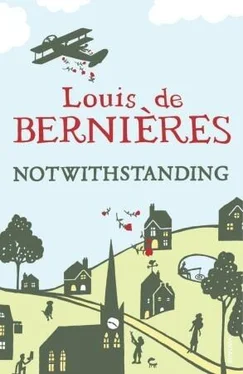When Uncle Dick returned two days later, with young Robert’s pet rook perched on his shoulder, he found Mr Chittock standing in the middle of the lawn gazing forlornly around at his molehills. He looked up and said, ‘Well, I’ve put the traps in the molehills, but I haven’t caught any.’
Uncle Dick took off his cap and scratched his head. He sighed and said, ‘You don’t put them in the molehills, sir.’
‘Oh, don’t you? Where else would they go?’
‘It’s like this, sir; the hills is at the end of side tunnels, and they scrape the spoil out of the main tunnels an’ up the side tunnels, just to get rid of it. They don’t come back, and if they do, they’re always pushing some soil in front of ’em, and what gets caught is the little bit of earth they’re pushing. You don’t hardly ever catch ’em by just sticking those things in the hills like that.’
‘Oh dear, what am I supposed to do then?’
‘You stick ’em in the main tunnels, sir. Here, I’ll show you.’ Uncle Dick pulled the traps out of the hills, and walked about very slowly, scrutinising the ground beneath him. Finally he stopped. ‘Here we are,’ he said, pressing down with his foot. ‘See that, sir? The ground gives just there, so there’s a tunnel right underneath. If you’d fetch me a trowel, I’ll show you what’s to do.’
Mr Chittock went to his potting shed and returned with a gleaming stainless-steel trowel that had clearly seen little service, and Uncle Dick knelt down and cut a neat square out of the turf. He excavated the hole a little, and put his hand in to investigate. ‘Right,’ he said, ‘the tunnel goes straight through there, so I’ll put the trap in.’ He set it carefully, and inserted it into the hole. Then he fetched a couple of handfuls of long grass and packed them loosely around the trap, sprinkling a little soil on top. He took a twig and stuck it into the ground beside the trap, saying, ‘Just to show where it is. It’s easy to trample ’em accidentally, like.’ He took the remaining two traps and recommenced his careful walking about. ‘Now look at this, sir,’ he said. ‘That’s a very, very small molehill, sir. That’s what I call a housekeeping hill. The tunnel goes right beside that, so you take a dig in it and find out which side the tunnel goes. Then you dig it out a bit more and set the trap as usual. And one more thing: moles are dead good smellers, so you don’t wash your hands with soap. In fact, it’s best to wear your gardening gloves or do some gardening first, so your fingers don’t pong of anything but soil.’
The next morning Mr Chittock found that two of the traps had been sprung. One was empty and the other came out of the ground with a large tube of dark-brown velvet mole in it. The jaws had clamped across its chest and neck, and its nose was bright red. Chittock felt a pang of guilty triumph. It was the first mole that he had ever actually seen, and he was fascinated by the big bony paddles fore and aft, the marvellously smooth close fur and the sharp little canine teeth, immaculately white.
Royston Chittock became fairly good at setting the traps, and he caught his quarry a good 50 per cent of the time. On each occasion that he caught a mole, he would clear the hills off the lawn, tip the soil on to the rose beds, and visualise all over again what it would be like to have a perfect lawn that was good enough to putt on. He might even install a bunker so that he could practise chipping out of it.
Inevitably there would be new molehills within five days. ‘Like I said,’ Uncle Dick informed him, ‘you should call in the moleman. As long as there’s moles in that meadow out there you’re going to get them coming back in here.’
So the moleman was summoned. Joshuah Entincknapp was a man in his sixties of stout peasant build. He was fond of saying that ‘Moles ’ave only got feet, they ’aven’t got legs’. He dressed in hobnail boots, corduroy trousers and a thick cotton shirt closed at the collar by a tatty old green woollen tie. Beneath his shaggy tweed jacket he sported a waistcoat of his own manufacture, consisting of precisely one hundred mole skins. There had been a time when he’d supplied a local furrier with best skins at sixpence each, and it had taken seven hundred skins to make a fine lady’s coat that would sell for forty guineas. He’d stretch the skins dry by nailing them to a board with one nail through the snout and one through each foot, so you wouldn’t damage the skin itself. Nowadays there wasn’t much of a market for them.
The most striking feature of the moleman’s appearance was the lack of his right eye, which did not have even a glass substitute in the socket. This loss had been brought about by a Rhode Island Red pullet when he was a toddler, his parents having left him in the chicken coop, under the illusion that he would be safe in there while they painted the kitchen. It felt odd to look at his face, depending upon whether one focused on the concave empty socket, or on the bright dark eye that gazed ironically from the other.
Joshuah Entincknapp had heard from Uncle Dick that Mr Chittock was something of a townie out of his depth in the countryside, and he therefore made a point of speaking slowly and carefully to him, to compensate for his backwardness. ‘Well,’ he explained, ‘Dick yonder was quite right. You can trap as many as you like in this garden o’ yours, but they’ll still be slippin’ in from that meadow, and I don’t reckon you’ll ever catch up with yourself. No you won’t. And what’s worse, this garden o’ yours, it’s like a main road, you got those moles passing through all the time when they’re going somewhere else, ’cause those moles don’t like to get too crowded, they like to live on their own, they do, so they got their own living quarters, and they don’t let no other moles in, and they also got these main roads that they share and share alike, and they use them roads to get from place to place, and it so ’appens you’ve got something like a Kingston Bypass going through ’ere, so you’ve got residents and you’ve got passers-through. Do you follow me, sir?’
‘Oh Lord,’ said Mr Chittock, ‘isn’t there anything you can do?’ He began to fear that he never would have a lawn good enough to putt on.
‘Well, it so ’appens that there is, but it all depends.’
‘Depends? Depends on what?’
‘Cats, sir. Do you ’appen to like cats?’
Royston Chittock gave the matter a moment’s thought. ‘Well, I can’t say I’ve ever known many. I’ve never had one. I’ve known one or two, to pat on the head, so to speak. Why do you ask?’
‘’Cause I got a cat and I hire ’im out, sir, but I’m warning you he’s expensive. He’s the best moling cat in Surrey, sir.’
‘A moling cat?’
‘Yes, sir, a moling cat. You see, cats are specialists, sir. You get cats who only do birds, and you even get cats that only do pigeons. You get cats that do rabbits and voles, but they won’t touch birds and mice. You even get cats that do frogs and nothing but. It so ’appens that there’s occasional cats that do nothing but moles, and it so ’appens that I’ve got one. But he’s expensive, sir.’
‘How much is he, then?’
‘Fifty pounds a week, sir, plus livin’ expenses, and I get the moles for the skins.’
‘Fifty pounds a week? That’s an awful lot. Really, fifty pounds a week?’
‘Best moler in Surrey, sir. He’ll clear that meadow ’til there’s not one left. He’s guaranteed.’
‘Really, it’s too much, Mr Entincknapp. I think I’ll persist with the traps.’
Mr Entincknapp shrugged. ‘As you wish, sir, but you know where I am if you change your mind. Mind you, there’s other things you can do.’
‘Really?’
Читать дальше












